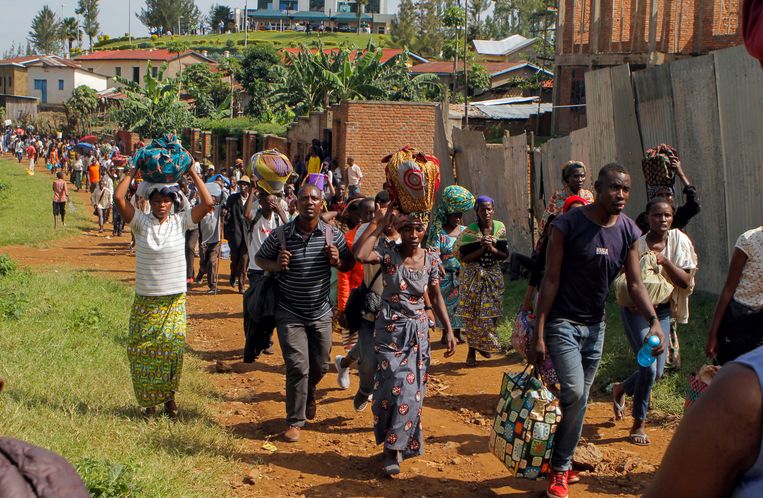On a steep hill, in a mild tropical climate, Kigali shimmers in the sun. The streets are very neat and cleaner than in Amsterdam. Glossy office buildings rise above Rwanda’s capital. Kigali radiates prosperity.
The heads of state of the 54 Commonwealth of Nations, which includes former British colonies, are scheduled to meet here on Monday. For the host, President Paul Kagame, this is a moment of glory after all the fuss over the transfer of asylum seekers from England to Rwanda. The country also generously welcomes refugees from neighboring Congo and Burundi. About 130,000 asylum seekers are staying in six refugee camps.
Photography
The small African country has two sides: there is unprecedented economic growth, but there is also severe repression from critics. Kagame and his ruling party, the Rwandan Patriotic Front, do not want to hear about the latter. “The image of Rwanda abroad is always black and white,” says Gerrit Noordam, who spent many years in the country as a Dutch diplomat and development worker for aid organization Zoa.
He is more positive about the country than many. He describes Rwanda as a shining example for Africa. After the genocide in 1994, in which 800,000 Tutsis and moderate Hutu were killed in a short period, the country rose from the ashes and flourished in less than thirty years.
According to Nordam, neighboring countries are jealous of the financial support Rwanda receives from donor countries and the investment of foreign companies. “Rwanda is well organized and safe and the government has a vision of where they want to go. This is not something you have in chaotic countries like Congo,” says Nordam, who now works for Zoa in the Congolese province of South Kivu, on the border with Rwanda. He still loves to visit Rwanda. When he brings guests from the West or Africa, they are amazed at the high level of development.

No respect for human rights
Louis Mudge also lived in Rwanda until his deportation in 2018. “I was the third director of Human Rights Watch in Central Africa to be forced to leave the country.” He now works from Kenya, because Rwanda does not tolerate criticism. “Rwanda does not respect human rights and there is no independent judiciary,” he says. “Why does the UK want to send asylum seekers there? Less than a year and a half ago, London harshly criticized Rwanda. And now?”
Rwanda is open to refugees, but they have to keep their mouths shut. Criticism is not accepted, no matter how justified. “The authorities in Rwanda have a short fuse. Rules are rules. If a police officer says a protest is prohibited, action will be taken if there is a demonstration, often with a strong overreaction,” Nordam says.
Twelve refugees were shot dead
Mudge witnessed it. When in 2018 the United Nations World Food Program and the United Nations High Commissioner for Refugees (UNHCR) cut the monthly payments for refugees to buy food due to insufficient funds, it led to protests in Kiziba camp. “The police intervened immediately. By the end of the day, twelve refugees had been shot dead, two women had miscarriages, and then about sixty people were arrested, some of whom were sentenced to up to fifteen years in prison,” says Mudge to show that this is the other side of Rwanda .
Uwimana lives in a refugee camp in Rwanda. That’s not his real name or he’d be in big trouble. He fled Burundi during the popular uprising seven years ago. He has recently been in trouble at another camp. He said by phone that his remarks immediately prompted a response from the police. He’s been intimidated ever since, to say the least.
Money is not enough
“Food is a problem for us refugees. I receive the maximum amount of 7,500 Rwf per month, about 7 euros, to live with my family who have two young children. “Luckily, my wife has a job,” he says, so he can make ends meet somewhat.
He says you can’t buy anything with 7,500 Rwandan francs. “A kilo of rice is about 2,000 RWF. A kilo of sugar is 1,500 Ruf. A kilo of beans is about 800 Ruf. If you don’t work, and it’s hard to find work here, you’re starving. Or you’ll have to go back to the country you fled from.”
Repression in Rwanda also led many Rwandans to flee the Kagame regime. But even abroad, they are not safe from the security services in their home country. “There, too, they can disappear or be kidnapped,” says Mudge. London has whitewashed those wrongdoings with an immigration agreement with Rwanda, which suits Kagame. “It brings a lot of money to Kigali,” says Mudge. Nor will the leaders of the Commonwealth take notice of this oppression from Monday, and they will see only an envious and prosperous capital.
Uwimana’s real name is known to the editors.
Read also:
Paul Rusesabagina, 67, star of Hotel Rwanda, was convicted of terrorism.
Paul Rusesabagina, 67, convicted of terrorism, heard the verdict in the Rwandan capital, Kigali, on Monday. The judge sentenced the man who played a major role in the feature film “Hotel Rwanda” to 25 years in prison. The public prosecutor had demanded a life sentence.

Zombie specialist. Friendly twitter guru. Internet buff. Organizer. Coffee trailblazer. Lifelong problem solver. Certified travel enthusiast. Alcohol geek.

